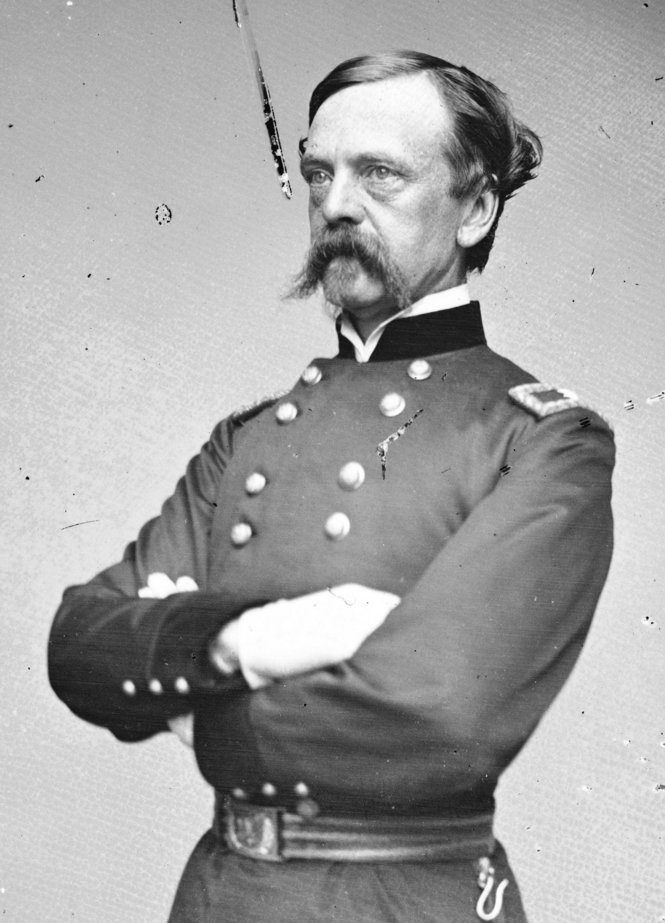
To listen to this reflection as a podcast, click here.
Daniel E. Sickles (1819-1914) considered himself one tough guy.
As a New York City politician in the 1850s he was involved in a number of public scandals.
When he learned that his young bride was having an affair with Philip Barton Key II (the son of Francis Scott Key, who had penned the words to The Star Bangled Banner), Sickles didn’t hesitate. While both men happened to be in the nation’s capital, he confronted Key in the park across from the White House and shot him dead.
Sickles was acquitted when he pled temporary insanity – the first time such a defense had ever been used in the United States.
Even though he was singularly unqualified to lead men into battle, Sickles managed to secure for himself an appointment as a Union general during the Civil War. On July 2, 1863, while commanding the II Corps of the Army of the Potomac, Sickles was ordered to hold the center of the Northern line at Gettysburg.
But Sickles had ideas of his own.
He rashly ordered his troops to advance about one mile forward to a peach orchard – a site that would become one of the war’s most infamous battlefields.
Unprotected, Sickles and his men were assaulted from multiple directions. They never had a chance. Only the heroism of other units which rushed in to plug the hole left behind by the II Corps saved the Union from disaster.
Years later, every principal general who fought at Gettysburg was memorialized with a statue somewhere on the grounds. Except Sickles. When asked about the absence of a memorial with his name on it, he said, “The entire battlefield is a memorial to Dan Sickles.”
OK, then.
The peach orchard did leave Sickles with an unusual souvenir. A cannonball shattered his right leg. It was amputated later that day in a field hospital. Ever the showman, Sickles had his leg pickled and displayed in his house so he could show it off to his party guests.
Unfortunately, the leg got the last laugh.
Sickles was afflicted for the rest of his life with phantom limb syndrome – the sensation that his leg was still present. He had no way to scratch the itches and relieve the pains that his brain “felt” up and down his absent leg. The tough guy had finally met his match.
Something like that can happen with another kind of wound: the kind you inflict on your own soul when you make some kind of grievous mistake.
You blew it. You sinned. You screwed up big time. You wonder how you ever could have been so stupid, so impulsive, so selfish, so blind. Will you ever get past the shame?
Even if you’ve paid for your mistake, and even if those you hurt have forgiven you, it can feel as if the wound happened yesterday. The sensation lingers that you’ve made such a capital mess of things that you don’t deserve a fresh start.
From time to time people wonder what it means, when it comes to a relationship to God, to “walk in faith.” Here’s your chance to find out.
When we abandon ourselves to Jesus, we receive God’s gift of the forgiveness of sins. That would be all of our sins. The little ones and the ones that keep us awake at night. The ones that happened last week and those that changed everything 30 years ago. We’re even forgiven of the sins that will happen tomorrow, and next week, and a decade from now.
Sometimes our regrets can feel so real that we’re led to believe there’s still a debt to pay.
But the psalmist rejoices that “as far as the east is from the west, so far has God removed our sins from us” (Psalm 103:12). Choose to believe that. Take it on faith.
Even if it doesn’t feel that way.
The Dutch author and Holocaust survivor Corrie ten Boom was fond of saying, “When God forgives our sins he throws them into the deepest sea, then puts up a sign that says, ‘No Fishing.’”
Win the battle that really matters.
Take God at his word that you are forgiven and free.
